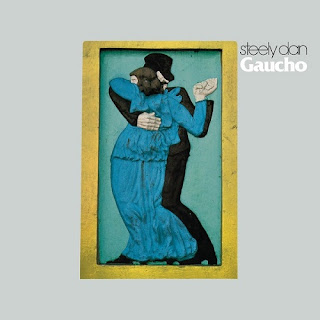Friday, May 23, 2025
Music Video Of the Week - May 23, 2025
Sunday, January 21, 2024
Rush - Permanent Waves (1980)
Friday, May 19, 2023
Music Video Of the Week - May 19, 2023
"On the Road Again" by Willie Nelson (Go to the link in the upper-right-hand corner.)
Sunday, November 7, 2021
Steely Dan - Gaucho (1980)
Off the road for years and down to just Walter Becker and Donald Fagen relying on a revolving door of backing musicians, Steely Dan had gotten just a little too comfortable in the studio by 1980, and Gaucho was the result of their complacency. The album is a set of songs offering clichéd depictions of the same sort of seedy characters they'd so vividly brought to life on earlier albums, and the music on Gaucho shows that Steely Dan's music had calcified into subdued, overproduced "smooth jazz" arrangements.
Conceptually, Gaucho mirrors Aja, with epic songs that allow the session musicians to stretch out but with none of the warmth and intimacy that characterized that earlier album. The sound is quite antiseptic, and the effect is soporific enough to listen to as an alternative to a Sominex. "Hey Nineteen," Gaucho's hit single about a May-December romance, is interesting mainly thanks to Steve Gadd's drumming, but even with Bernard Purdie's shuffling beat, "Babylon Sisters" actually makes depravity sound boring. "Glamour Profession," like "Babylon Sisters" a song about the decadence of southern California, has a little more punch to it, but no heart, either. And you would expect a song like the title track, about a guy being used by a friend to do a favor for his friend's partner, to be edgier than the actual song is. And the pseudo-blues-rock arrangement for "Time Out of Mind" almost evaporates into thin air.
The problems with Gaucho are largely the sedate keyboards and the relaxed brass sections, and there's no one comparable to a Skunk Baxter or an Elliott Randall to provide a memorable guitar solo. (Dire Straits' Mark Knopfler played a solo for "Time Out of Mind," but his contribution got edited and mixed down to almost nothing.) Becker and Fagen certainly didn't do their session players any favors; the basic tracks were subjected to numerous retakes, and the songs underwent countless remixes before the duo were satisfied, though more often than not they settled for whatever they could get. Steely Dan let the perfect be the enemy of the good on Gaucho, and as a result the album wasn't much of either. No wonder Becker and Fagen, apart from helping Rosie Vela with her 1986 album ZaZu, wouldn't work together again for over a decade.
(After four album reviews - all of which were downers, more or less - I'm taking another break from reviewing records. I should be back soon, and at least I got them started on a semi-related basis again.)






